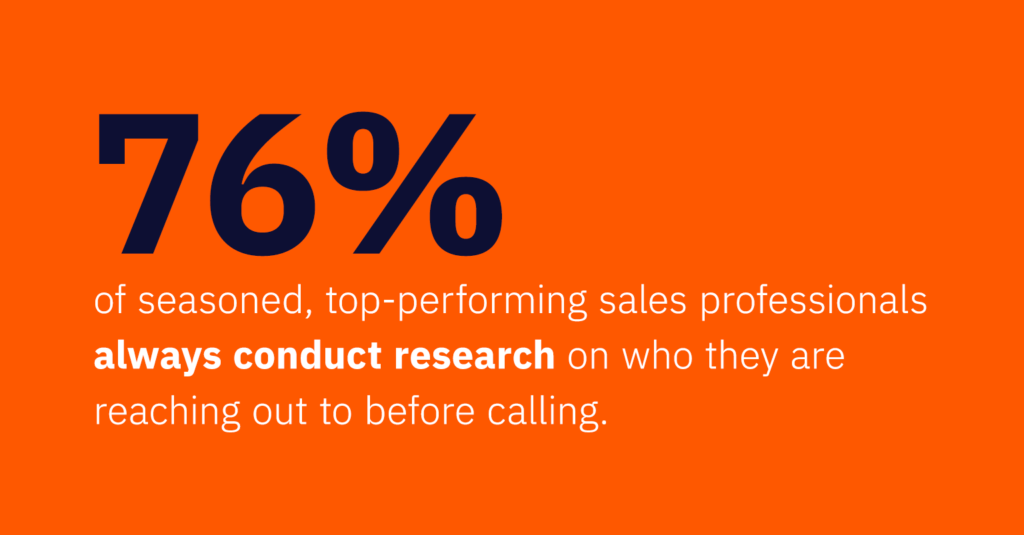Need more leads?
Invest in professional marketing services from WebFX and kick your company’s growth into high gear.

And why are we hiring newbies to do one of the most important sales jobs, anyway?
Cold calling and winning top-of-funnel leads is hard. Even if your business development reps have had some training, the fact of the matter is prospects are more likely to say “No” to the average beginner level BDR than they are to a seasoned sales veteran.
But that’s where the problem becomes the solution.
Because the majority of your competition is also targeting prospects with newbie BDRs, there is a lot of opportunity for experienced reps to come in and sweep top decision makers off their feet.
In order to make that happen, however, you’ll need to make sure the person on your end of the call is highly effective. They need to get through to the right people, inspire engagement, and book the meeting. How can you expect someone with a few months or weeks on the job to do this hugely challenging task well?
While the rise of AI and automation is transforming prospecting tasks, the Business Development Representative (BDR) role is not becoming extinct but is instead evolving into a more strategic function. The article argues that while technology can handle repetitive outreach, the uniquely human skills of building rapport, understanding complex customer needs, and thinking critically are irreplaceable for effective top-of-funnel engagement. Therefore, the future BDR will need to act more like a consultant, using technology to enhance their ability to create genuine connections and qualify high-value opportunities.
In order to understand where we are going, we have to look back on where we came from.
Before we dive in, let’s clarify what a BDR is in sales. A business development representative (BDR), also sometimes called a sales development rep (SDR), is a key role focused on outbound prospecting. Their primary responsibility is to identify and qualify potential leads, setting the stage for the sales team to close deals. They are the engine that drives the top of the sales funnel.
The role of BDR was created out of need. But our needs have changed. Let’s take a closer look at what it means to be a business development rep back in the day versus now.
Sales development as we know it was first pioneered in 1984 by Stu Silverman and tech giants such as Oracle. We can all agree that the world and how we work in it has changed a lot since then. So has sales.
Back then, phone calls were the best way to get the attention of prospects at the time. Sales phone calls led to the invention of tools such as power dialers, predictive dialers, and the first wave of CRMs.
Salesforce changed the game in the early 2000s by asking BDRs to add email to the mix. And, crucially, Salesforce is also credited with launching the sales hierarchy workflow where leads are first qualified before being passed on to other sales team members.
Today, many BDRs lean into email first and phone second with a mix of professional social media reach outs.
With this increased access to different channels prospects use multiple times a day it would be safe to assume that outbound cold prospecting must be more effective than ever before. But it isn’t all sunshine and closed deals.
In theory, SDRs now have it easier than their power dialing predecessors. In practice? Not so much and here’s why.
A phone call isn’t just a phone call for the newbies in the role of Business Development Representative.

76% of seasoned, top-performing sales professionals always conduct research on who they are reaching out to before calling. But many newly minted BDRs either won’t think to do that or are under too much pressure to take the time.
Or, if they do conduct the research, they likely won’t have the wisdom of knowing what to look for or how to use the information they do find. That kind of knowledge comes from firsthand experience.
And with some BDRs turning to more creative (and some would say desperate) measures such as cold FaceTiming to reach prospects, it’s no wonder why this sales team role is close to making the endangered species list.
All of this to say: Although the title is still around, it’s been almost 50 years since the BDR was first conceived and has undergone dramatic transformations since. Those new to sales are no longer the best fit for this demanding position.
It’s not all doom and gloom though!
Choose the model that best fits your business and see how we help teams like yours close more deals.
How do you sell?

Consumer preference, workplace predictions, and fluctuating job markets all have the potential to completely change the way we sell in as few as five years. This will usher in an era of new opportunity for developmental sales talent. It also means we can look forward to healthier workplaces and new sales team roles that set new sellers up for success long term.

Experts agree that traditional B2B sales and marketing are becoming obsolete. This is mainly due to the fact that most purchasing activities are done independently now. From learning about available solutions to conducting a teamwide vote, modern buyer decision-making leaves little room in their process for actually interacting with suppliers. Sales reps are now just one of many channels for prospects to engage with.
With fewer opportunities to speak with prospects, sales teams will need to hone in on providing the best possible information whenever they are given the opportunity. Business development reps just starting out should focus on becoming product experts in the short term.
One example of a sales team that is already doing this successfully is Paychex, which uses their own employee onboarding software to create personalized training programs for new hires on their sales team. Their hybrid training and development structure combines “virtual learning at an employee’s home base and instructor-led learning at a state-of-the-art training facility in Rochester, New York.”
In addition to education around the brand’s mission, new recruits (the majority of whom work in sales and services) get the ins and outs of products and services offered. This is one of the main reasons why Selling Power magazine has named Paychex one of the 50 Best Companies to Sell For.
So if your company or a company you’d like to work for doesn’t already offer a strong product knowledge and onboarding training experience for new business development reps, suggest it.
In a nutshell: Shifting buyer preferences will force teams to reconfigure their entire organizational structure in order to bridge the gap between outdated linear buying cycle models and the actual ways prospects make decisions now.
So what should newbies be doing in the sales field? Here’s how you should start your sales career.
CBRE, Genesis, and the Wall Street Journal have all conducted reports on the future of work. Here’s an overview of what they found:
The elimination of team hierarchies means that roles in management and development will decrease while simultaneously opening up a new world of possibilities for those just starting out in sales.
In a nutshell: This holistic approach to where we work and how we work will lead to skill advancement opportunities for BDRs that will grow their career beyond the traditional sales ladder.
There is a lot of fear and anxiety around a potential upcoming recession that will further propel the demand for positive workplace changes. As beginning and intermediate BDRs steel themselves for what comes next, they are using their time wisely and pursuing avenues they might not have prioritized or had time for otherwise. And the timing couldn’t be more perfect.
As we’ve mentioned above, consumers will soon need product experts at the frontlines of the sales team. And experts agree that specialists will be in higher demand than ever by 2030. So if you’ve ever thought about going all in on a certain aspect of business or sales development, now’s the time. Doing so will make you a more effective member of your current team while also giving you a leg up if you ever leave.
In a nutshell: The world is changing and even if BDRs do become extinct, both budding and experienced sales reps will have opportunities to flourish beyond what we previously imagined.
And yet the future is still bright.
The sales world has changed so much in the last 50 years. And even as we head into uncertain times, we know for sure that it will continue to evolve in the future.
Only one thing is certain: the coming decade will shake up our past notions of how sales “should” work, challenging us all to think more about how it “could” work.
That could mean eliminating positions that no longer suit modern consumer and employee needs. That could also mean empowering business development reps to think of their work as a craft and embrace opportunities to improve their skills.
Either way, as we peer into the crystal ball for closers, we’re excited by the potential of what we see.
Unlikely. The role is evolving rather than disappearing. Repetitive tasks (list building, basic personalization, data entry) are shifting to automation and AI, while BDRs increasingly focus on higher-value work like multithreaded outreach, qualification, and tailored business cases.
AI accelerates prospect research, intent detection, email drafting, call/meeting summarization, lead scoring, and routing. The upside is more conversations with better fit buyers. The risk is over-automation and generic outreach, so governance, good data, and thoughtful human oversight are essential.
It depends on your ACV, sales cycle length, and inbound volume. Lower ACV or strong inbound motions often favor self-serve + inbound SDR coverage. Mid-market can benefit from hybrid models. Enterprise motions still see ROI from specialized BDRs focused on targeted, account-based outreach. Validate with funnel metrics and CAC payback before restructuring.
Commercial acumen and research, clear writing, multichannel orchestration (email, phone, social, video, SMS), objection handling, data/CRM hygiene, light analytics, and responsible AI use (prompting, reviewing, and improving AI outputs). Collaboration with marketing and RevOps to test and scale what works is key.
Nutshell combines CRM with AI features to reduce manual work and improve outcomes: prospecting and enrichment (Nutshell IQ), AI email starters/replies, meeting and call summarization, timeline/context summaries, forms and chat to capture inbound, sequences/automation to orchestrate outreach, and reporting to track conversion rates and pipeline. You can start a trial or request a demo to see it in action.
See how Nutshell can help your sales development reps succeed. Take advantage of our 14-day free trial, where you’ll have the opportunity to try out every Nutshell feature and determine whether it’s the ideal fit for your sales development needs.
You can also speak to one of our experts for more information on how Nutshell can help you improve your lead qualification process and encourage more deals. Choose the model that best fits your business and see how we help teams like yours close more deals.
Invest in professional marketing services from WebFX and kick your company’s growth into high gear.


Join 30,000+ other sales and marketing professionals. Subscribe to our Sell to Win newsletter!